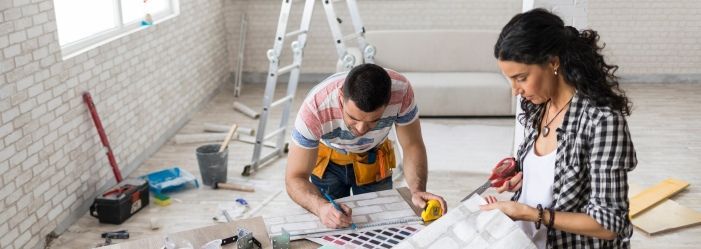Last Updated: March 22, 2024
Home Upgrades That Make Sense

Disclaimer: We are not qualified legal or tax professionals and are not giving advice. Always speak with a qualified professional before making any legal or financial decisions.
Considering a major home improvement project can be both exciting and overwhelming. With the right upgrades, you can transform your living space and potentially increase your home's value.
However, financing these improvements often means taking on debt, which requires a careful balancing act between your dreams and your financial health.
In this guide, we'll explore the ins and outs of using loans for home renovations, helping you make informed decisions that align with your long-term financial goals.
Let’s dive into the world of home improvement financing, examining the potential benefits and pitfalls, so you can build your dream home without compromising your financial future.
Don't want to read through? Speak to a debt specialist right now.
Paying for Upgrades
There are several ways to pay for your renovations and unfortunately, most of them include taking on debt. Before you decide to undertake home improvement, look into how you will pay for it. Most of us are already in debt and going further into debt may be a very bad idea.
Pay As You Go - if you have the time and inclination to wait, save up the cost of your home improvement and then pay as you go. Since most of us can’t save up a decent amount of money, saving for a big purchase can be difficult and take practically forever.
Personal Loans or Home Improvement Loans - a personal loan is an unsecured loan. This means that because you do not have to put up collateral, the interest rates are higher than other types of loans. Interest rates depend on your credit score but currently range from 4.9% to 36% and have terms from one to seven years. Credit unions and other financial institutions may offer better terms on loans specifically for home improvement over a personal loan.
Home Equity Loans - these loans allow you to borrow against your home up to 85% of the equity. Home equity is how much your home is worth minus how much you still owe. You are also required to put up your home as collateral in case you default, at which point, the lender owns part of your home. These loans have fixed interest rates and a fixed term, so you know how much you will pay for how long. Terms range from 5 to 30 years and the interest rates are determined by your credit score.
Home Equity Line of Credit Loan (HELOC) - these loans are similar to home equity loans but are structured more like a credit card loan. They are a revolving loan which means you can use up to a predetermined credit limit and as a long as you make monthly payments, you can keep charging against the HELOC. The interest rate is variable and the terms are basically infinite as long as you own your house. Your house is collateral for the loan.
Credit Cards - while using a credit card for some home improvement projects is a great idea for additional warranties, the high interest rates make using them a bad idea. If you use a credit card for your home improvement projects, always pay it off in full every month.
FHA Title 1 Loans - these loans are issued by a bank but are insured by the Federal Housing Administration. These loans can be used to make your home more livable or energy efficient as long as the upgrades are permanent and are not a luxury item. So plumbing, yes, outdoor kitchen, no. Depending on the amount you borrow, you may or may not need to put up collateral.
What Projects Have The Best Return on Investment?
Return on Investment or ROI is the ratio between how much you spent on a project versus how much you can expect to raise your home’s value. All the home improvement projects will change your home’s value both immediately and over time. Let’s look at the three different categories for home improvement: infrastructure, interior, and exterior.
Infrastructure projects are those that improve the home’s energy efficiency or safety. Adding insulation to the attic will not only improve your home’s energy efficiency, which will show up in the utility records that real estate agents request, but will immediately improve your home. It is simple and relatively inexpensive. Realtor.com lists attic insulation as a huge selling point and often comes with a 116.9% return on investment. Adding smart or programmable thermostats is another excellent ROI. Replacing windows with energy-efficient ones is a great selling point. You can expect your ROI to be upwards of 70%. Other highly rated infrastructure projects include a new garage door and entry door, both of which will add to your home’s energy efficiency and security. Other good ROI projects include replacing HVAC, a new roof in some situations, and broken or leaky plumbing.
Exterior projects are, obviously, those that improve the exterior of your home. If your home doesn't have curb appeal, home buyers might just pass you by. Replacing old siding, fresh paint, and possibly a new deck can reap decent ROIs. Solar lighting can make your entrance more attractive without adding a lot of cost. Items like swimming pools, hot tubs, and high-effort landscaping are generally not worth the time, effort, and money.
Interior projects range from a single coat of paint to a kitchen remodel to additions. These often come with fairly unattractive ROIs. Fresh paint in neutral colors is possibly the fastest and cheapest way to upgrade your home. The ROI is definitely in your favor as your home will look better, feel better, and photograph better.
Minor kitchen and bathroom remodels can be far more effective for ROI than complete remodels. Modernize fixtures and door pulls, and fresh paint and remove that nasty 1970s vintage carpet, ROI that will make your efforts worthwhile. Additions are often not worth the money and the hassle. Taking two bedrooms and creating one master suite from them probably will not increase your home’s value and may decrease it. Adding another bathroom can be problematic.
Before you tackle a big project like this, talk to a real estate agent. They know what home buyers are looking for. It may even be beneficial to look at your local home values and talk to neighbors who have done a remodel and had their homes reappraised. They may offer helpful feedback or advice on which projects actually added value to their home.
Deciding Which Projects to Prioritize
With the high costs of home improvements, it's important to decide which projects should be top priority.
Here are some tips for determining which home upgrades will give you the most bang for your buck:
- Focus first on repairs or improvements that address safety, security, or health issues. For example, replacing a leaky roof.
- Next prioritize energy efficiency upgrades like insulation, new windows, or HVAC replacements. These can lower your utility bills.
- Consider which projects may increase your home's value the most when it comes time to sell. Kitchen and bathroom remodels often have high ROIs.
- Weigh the costs versus the benefits for luxury projects like pools or outdoor kitchens. These likely won't boost your home value.
Budgeting For Your Home Improvements
Careful planning can help you afford your renovations without painful debt.
Follow these budgeting tips:
- Get multiple quotes to find the best pricing from reputable contractors.
- Factor in permits, labor, materials, and other costs beyond just installation. Unexpected expenses pop up.
- Consider setting up a dedicated savings account and setting aside money monthly to cover home upgrades, repairs, and maintenance.
- If remodeling, opt for mid-range or standard finishes rather than luxury materials to save money. You can still enhance your style affordably.
Stick closely to your home improvement budget and adjust plans if needed so as not to overspend what you can afford.
Should You Go into Debt to Make Home Improvements?
We are back to the original question. The answer is if you choose your projects wisely and find the best financing for your situation, going into a bit of debt can be worth it. With carefully planned upgrades, you can make your home a far nicer place to live now and an easier sell in the long run. However, if you are throwing away money on upgrades that will not benefit you in the long run, going into debt is a very bad idea. And if you are not financially sound, taking on more debt is a monumentally bad idea!
Comparing Financing Options
With any home improvement project, you'll need to explore different financing options like personal loans, home equity loans, and credit cards. Compare interest rates, fees, loan terms, tax implications, and other factors before deciding on the best approach for your situation.
Increasing Curb Appeal Cost-effectively
You don't need to break the bank to give your home an exterior facelift. Simple upgrades like a fresh coat of paint on your home's exterior, updating exterior lighting fixtures, or adding new house numbers or mailboxes can make a big visual impact. Landscaping also goes a long way if done right, without going overboard. Focus on neatness and well-maintained greenery rather than complex hardscaping projects.
Consulting the Experts
Get guidance from professionals like real estate agents and home appraisers on which renovations make the most financial sense in your local market. They can advise if a full second bathroom adds value, or if a minor kitchen refresh is best.
FAQs
Conclusion
Determining whether to take on debt to pay for home improvements requires careful evaluation of your specific situation. While strategic renovations can increase home value and quality of life, overspending on luxury add-ons or tackling too many projects at once can lead to a painful financial burden.
When making decisions:
- Prioritize fixes addressing safety, efficiency, and function over aesthetics alone
- Calculate total costs and stick to budgets
- Explore all financing options thoroughly, from personal loans to home equity
- Consult experts to determine the best projects for your market
- Focus on renovations with proven, significant ROIs
With thoughtful planning, you can complete home upgrades that make sense without unwanted debt stress.
Pacific Debt, Inc
If you made some home improvement decisions in the past and have more than $10,000 in credit card debt, Pacific Debt, Inc may be able to help. We will explain all your debt relief options and help you decide which is the best option for you. We can even refer you to a trusted partner if they can better assist you.
If you have questions, contact one of our debt specialists today.
*Disclaimer: Pacific Debt Relief explicitly states that it is not a credit repair organization, and its program does not aim to improve individuals' credit scores. The information provided here is intended solely for educational purposes, aiding consumers in making informed decisions regarding credit and debt matters. The content does not constitute legal or financial advice. Pacific Debt Relief strongly advises individuals to seek the counsel of qualified professionals before undertaking any legal or financial actions.
Reduce Your Credit Card Debt By Up to Half

BBB Reviews | 4.9/5.0 Rating









 Do Not Sell My Personal Information
Do Not Sell My Personal Information